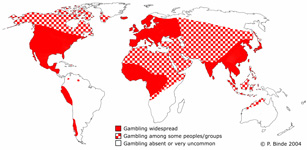One of the first things that I did when I started to study gambling 13 years ago was to read a lot of ethnography to get a grip on in which societies gambling was practiced and how people gambled in various parts of the world. On the basis of a large number of historical, anthropological and ethnographical sources, I drew a map (see picture to the right) that showed the approximate extent of indigenous gambling in the pre-colonial world. The main finding was that in the past there were large areas of the world with little or no gambling. This finding dismisses the wide-spread misconception that gambling has been practiced in all times and in all societies. The map and a discussion of the pattern that it reveals of gambling and non-gambling cultures was published 2005 in the journal International Gambling Studies.
> Binde, P. 2005. Gambling across cultures: Mapping worldwide occurrence and learning from ethnographic comparison. International Gambling Studies 5(1), 1-27.
Recently an article by three linguists was published in the journal Functions of Language – “Sources of BET”. It is a cross-language study, covering 177 languages from all over the world, of the word “bet” and its synonyms. Of particular interest (at least to me) is the geographical distribution of the word “bet”. The authors compare their linguistic findings with my world map of indigenous gambling and conclude:
“It seems that overall that incidence of indigenous gambling and extent of lexicalization of betting is similarly distributed.”
My interpretation of that is that in cultures without gambling, there were no need for a word with the meaning “bet”.
However, there is one notable discrepancy between my map and the linguistic distribution of the word “bet”: southeast Africa. I did not find any evidence of gambling in that part of the world (except the Tanala people of Madagascar) but there is some linguistic evidence of the word “bet”. So it may very well be that gambling was practiced in pre-colonial times among some peoples in southeast Africa.
Article information: Ponsford, D., W. Hollmann & A. Siewierska. 2013. Sources of BET. Functions of Language 21(1), 90-124.
> Link to journal article
> Link to “post-acceptance” version (free)


